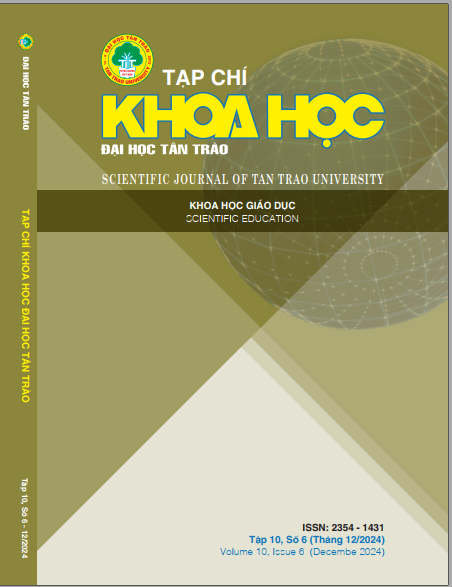NHỮNG THÁCH THỨC CỦA SINH VIÊN CHUYÊN NGÀNH TIẾNG ANH Ở ĐẠI HỌC THỦ ĐÔ HÀ NỘI ĐỐI VỚI VIỆC HỌC TIẾNG ANH CHUYÊN NGÀNH (ESP)
DOI:
https://doi.org/10.51453/2354-1431/2024/1259Từ khóa:
thách thức, ESP, người học chuyên ngành tiếng Anh, khó khăn, trở ngại.Tóm tắt
Nhu cầu về trình độ tiếng Anh chuyên ngành đối với sinh viên tốt nghiệp ngày càng tăng, đã đòi hỏi phải xem xét kỹ hơn những thách thức mà người học chuyên ngành tiếng Anh (ESP) phải đối mặt trong việc tiếp thu các kỹ năng tiếng Anh chuyên ngành (ESP). Nghiên cứu này nhằm mục đích điều tra những trở ngại cụ thể mà những người học ở trường Đại học Thủ đô Hà Nội gặp phải, với mục tiêu có một cái nhìn sâu hơn cho việc phát triển các chiến lược học tập và cơ chế hỗ trợ học tập hiệu quả hơn. Thông qua việc tìm hiểu những thách thức mà sinh viên năm cuối chuyên ngành tiếng Anh gặp phải khi học tiếng Anh chuyên ngành, nghiên cứu này đóng phần vào việc nâng cao dạy và học tiếng Anh chuyên ngành và tạo điều kiện cho sinh viên cơ hội thành công về mặt học thuật và nghề nghiệp. Nghiên cứu sử dụng phương pháp tiếp cận hỗn hợp, kết hợp cả các thủ thuật thu thập dữ liệu định tính và định lượng, bao gồm phỏng vấn, khảo sát và phân tích tài liệu. Kết quả nghiên cứu cho thấy một loạt các thách thức mà người học đối mặt, bao gồm rào cản ngôn ngữ, sự khác biệt về văn hóa, hạn chế về mặt sư phạm và các yếu tố tình cảm. Những hiểu biết này làm nổi bật nhu cầu về một phương pháp tiếp cận toàn diện, lấy người học làm trung tâm đối với hướng dẫn học tiếng Anh chuyên ngành, giải quyết các nhu cầu ngôn ngữ, học thuật và nghề nghiệp độc đáo của những người học chuyên ngành tiếng Anh.
Tải xuống
Tài liệu tham khảo
Chand, G. B. (2021). Challenges Faced by Bachelor Level Students While Speaking English. Indonesian Journal of English Language Teaching and Applied Linguistics, 6(1), 45-60.
Chi, N. T. N., & Ái, N. N. (2023). Những khó khăn trong dạy và học tiếng Anh chuyên ngành tại trường Đại học Mở Hà Nội. Journal of Language and Life, 11 (193), 27-32.
Daar, G. (2020). Problems of English Language Learning in Context. PKBM SAMBI POLENG, 1-124.
González Ardeo, J. M. (2016). Learning motivation and strategies of ESP university students. LFE. Revista de Lenguas para Fines Específicos.
Hijuelos-Cruz, I., Medina-Carballosa, E., & Pérez-Almaguer, R. (2020). English for Specific Purposes (ESP): A Theoretical Approach for Syllabus Design. Luz, 19(4), 116-127.
Hutchinson, T., & Waters, A. (1987). English for specific purposes. Cambridge university press.
Lam, Q.Đ (2011). Tiếng Anh chuyên ngành-một số vấn đề về nội dung giảng dạy, Journal of Language and Life, 11 (193), 27-32.
Rahman, M. (2015). English for Specific Purposes (ESP): A Holistic Review. Universal Journal of Educational Research, 3(1), 24-31.
Ramírez, C. G. (2015). English for specific purposes: Brief history and definitions. Revista de lenguas modernas, (23).
Sarifa, N., & Jabeen, R. (2024). Challenges and Predicaments in Teaching “English for Science” in an ESP Classroom: A Research Study to Pinpoint Problems and Solutions. International Journal of English Language Teaching, 12(1), 80-89.
Tantog, Alfer & Alayon, Mario & Gaan, Dayanara & Bodiongan, Leah & Deluna, Carla & Florendo, Tj. (2022). Challenging Experiences of English Major Students in Language Studies. 6. 289-297.
Tran, T. Q., & Pham, N. T. (2022). English language teachers' perceptions of the factors affecting their English for specific purposes (ESP) teaching. TNU Journal of Science and Technology, 227(06), pp.20-26.
Tran, Q. T., & Duong, M. T. (2018). The difficulties in ESP reading comprehension encountered by English–majored students. VNU Journal of Foreign Studies, 34(2).
Tải xuống
Đã Xuất bản
Cách trích dẫn
Số
Chuyên mục
Giấy phép

Tác phẩm này được cấp phép theo Giấy phép Quốc tế Creative Commons Attribution-ShareAlike 4.0 .
Bài báo được xuất bản ở Tạp chí Khoa học Đại học Tân Trào được cấp phép theo giấy phép Ghi công - Chia sẻ tương tự 4.0 Quốc tế (CC BY-SA). Theo đó, các tác giả khác có thể sao chép, chuyển đổi hay phân phối lại các bài báo này với mục đích hợp pháp trên mọi phương tiện, với điều kiện họ trích dẫn tác giả, Tạp chí Khoa học Đại học Tân Trào và đường link đến bản quyền; nêu rõ các thay đổi đã thực hiện và các nghiên cứu đăng lại được tiến hành theo cùng một bản quyền.
Bản quyền bài báo thuộc về các tác giả, không hạn chế số lượng. Tạp chí Khoa học Tân Trào được cấp giấy phép không độc quyền để xuất bản bài báo với tư cách nhà xuất bản nguồn, kèm theo quyền thương mại để in các bài báo cung cấp cho các thư viện và cá nhân.
Mặc dù các điều khoản của giấy phép CC BY-SA không dành cho các tác giả (với tư cách là người giữ bản quyền của bài báo, họ không bị hạn chế về quyền hạn), khi gửi bài tới Tạp chí Khoa học Đại học Tân Trào, tác giả cần đáp ứng quyền của độc giả, và cần cấp quyền cho bên thứ 3 sử dụng bài báo của họ trong phạm vi của giấy phép.






